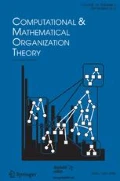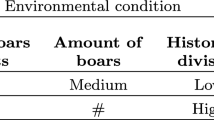Abstract
Trust is a dynamic and complex phenomenon and understanding the factors which affect its formation, evolution and disappearance is a critical research issue. It has been shown that trust plays a key role in how human and social capital develop, how economies grow and how societies progress. In this paper, we present an agent-based model of the relations between a dynamic effort allocation system, an evolving trust framework and a reputation module to study how changes in micro-level rent-seeking traits and decisions can shape the emergence of trust across the simulated environment. According to our results, variations in trust are correlated more with the returns to being productive, rather than rent-seeking. In line with previous studies, our model shows that higher than average levels of risk-taking by agents lead to further trust and gains during an interaction, though taken to an extreme, both trust and gain can decline as a result of reckless decisions. We also report on the formation of trust clusters in our model as an emergent phenomenon.









Similar content being viewed by others
Notes
The distance between two agents, one at (x 1, y 1) and the second one at (x 2, y 2) is measured as \(\sqrt{} ((x_{2} - x_{1})^{2} + (y_{2} - y_{1})^{2})\).
As H and D are link variables, when we refer to an honest (or H) agent or dishonest (or D) agent, we are actually referring to an agent who is undertaking a H or D strategy in one interaction over one of her links.
It calculates the Akaike information criterion for measuring the goodness of fit. Source: http://stat.ethz.ch/R-manual/R-devel/library/MASS/html/stepAIC.html.
According to the documentation, leaps “performs an exhaustive search for the best subsets of the variables in x for predicting y in linear regression, using an efficient branch-and-bound algorithm.” Source: http://cran.r-project.org/web/packages/leaps/leaps.pdf.
References
Baumol WJ (1990) Entrepreneurship: productive, unproductive, and destructive. J Polit Econ 98(5):893–921
Bhagwati JN (1982) Directly unproductive, profit-seeking (DUP) activities. J Polit Econ 90(5):988–1002
Breuer JB, McDermott J (2012) Culture, caution, and trust. J Dev Econ 97(1):15–23. doi:10.1016/j.jdeveco.2011.02.001
Burcu Ö, Christian B (2011) Social trust and human development. J Socio-Econ 40(6):753–762
Fukuyama F (1995) Trust: the social virtues and the creation of prosperity. Free Press, New York
Girvan M, Newman MEJ (2002) Community structure in social and biological networks. Proc Natl Acad Sci USA 99(12):7821–7826. doi:10.1073/pnas.122653799
Greif A (1989) Reputation and coalitions in medieval trade: evidence on the Maghribi traders. J Econ Hist 49(04):857–882. doi:10.1017/S0022050700009475
Greif A (1993) Contract enforceability and economic institutions in early trade: the Maghribi traders’ coalition. Am Econ Rev 83(3):525–548
Grimm V, Berger U, DeAngelis DL, Polhill JG, Giske J, Railsback SF (2010) The ODD protocol: a review and first update. Ecol Model 221(23):2760–2768
Hausken K (2005) Production and conflict models versus rent-seeking models. Public Choice 123:(1/2):59–93
Johnson ND, Mislin AA (2011) Trust games: a meta-analysis. J Econ Psychol 32(5):865–889. doi:10.1016/j.joep.2011.05.007
Karlan D, Mobius M, Rosenblat T, Szeidl A (2009) Trust and social collateral. Q J Econ 124(3):1307–1361. doi:10.1162/qjec.2009.124.3.1307
Knack S, Keefer P (1997) Does social capital have an economic payoff? A cross-country investigation. Q J Econ 112(4):1251–1288. doi:10.1162/003355300555475
Krueger AO (1974) The political economy of the rent-seeking society. Am Econ Rev 64(3):291–303
Kydd AH (2005) Trust and mistrust in International relations. Princeton University Press, Princeton
Kydd AH (2010) Learning together, growing apart: global warming, energy policy and international trust. Energy Policy 38(6):2675–2680. doi:10.1016/j.enpol.2009.05.056
La Porta R, Lopez-de-Silanes F, Shleifer A, Vishny RW (1997) Trust in large organizations. Am Econ Rev 87(2):333–338
Labonne J, Chase RS (2010) A road to trust. J Econ Behav Organ 74(3):253–261. doi:10.1016/j.jebo.2010.03.022
Landa JT (1981) A theory of the ethnically homogeneous middleman group: an institutional alternative to contract law. J Leg Stud 10(2):349–362
Landa JT (1994) Trust, ethnicity, and identity: beyond the new institutional economics of ethnic trading networks, contract law, and gift-exchange. economics, cognition, and society. University of Michigan Press, Ann Arbor
Macy MW, Sato Y (2002) Trust, cooperation, and market formation in the US and Japan. Proc Natl Acad Sci USA 99 (Suppl(3):7214–7220. doi:10.1073/pnas.082097399
Macy M, Sato Y (2008) Reply to Will and Hegselmann. J Artif Soc Soc Simul 11(4):11
Murphy KM, Shleifer A, Vishny RW (1993) Why is rent-seeking so costly to growth? Am Econ Rev 83(2):409–414
Ostrom E (2000) Collective action and the evolution of social norms. J Econ Perspect 14(3):137–158
Ostrom E, Walker J (2003) Trust and reciprocity: interdisciplinary lessons from experimental research. Russell Sage foundation series on trust, vol 6. Russell Sage Foundation, New York
Quddus M, Goldsby M, Farooque M (2000) Trust: the social virtues and the creation of prosperity–a review article. East Econ J 26(1):87–98
R Development Core Team (2011) R: a language and environment for statistical computing. R Foundation for Statistical Computing, Vienna, Austria
Ramchurn SD, Huynh G, Jennings NR (2004) Trust in multi-agent systems. Knowl Eng Rev 19(01):1–25
Roth F (2009) Does too much trust hamper economic growth? Kyklos 62(1):103–128. doi:10.1111/j.1467-6435.2009.00424.x
Sabater J, Sierra C (2005) Review on computational trust and reputation models. Artif Intell Rev 24(1):33–60. doi:10.1007/s10462-004-0041-5
Schlosser A, Voss M, Brückner L (2005) On the simulation of global reputation systems. J Artif Soc Soc Simul 9(1):4
Tatham P, Kovács G (2010) The application of “swift trust” to humanitarian logistics. Int J Prod Econ 126(1):35–45. doi:10.1016/j.ijpe.2009.10.006
Tollison RD (1982) Rent seeking: a survey. Kyklos 35(4):575–602. doi:10.1111/j.1467-6435.1982.tb00174.x
Uslaner EM (2002) The moral foundations of trust. Cambridge University Press, Cambridge
Vogler J (2010) The institutionalisation of trust in the international climate regime. Energy Policy 38(6):2681–2687. doi:10.1016/j.enpol.2009.05.043
Wang L, Gordon P (2011) Trust and institutions: a multilevel analysis. J Socio-Econ 40(5):583–593. doi:10.1016/j.socec.2011.04.015
Wilensky U (1999) NetLogo: center for connected learning and computer-based modeling. Northwestern University, Evanston
Will O (2009) Resolving a replication that failed: news on the Macy & Sato model. J Artif Soc Soc Simul 12(4):11
Will O (2010) HUME1.0—an agent-based model on the evolution of trust in strangers and division of labour multi-agent-based simulation. In: Di Tosto G, Van Dyke Parunak H (eds) Lecture notes in computer science, vol 5683. Springer, Berlin, pp 123–134. doi:10.1007/978-3-642-13553-8_11
Will O, Hegselmann R (2008a) Remark on a reply. J Artif Soc Soc Simul 11(4):13
Will O, Hegselmann R (2008b) A replication that failed—on the computational model in Michael W. Macy and Yoshimichi Sato: trust, cooperation and market formation in the US and Japan. proceedings of the national academy of sciences, may 2002’. J Artif Soc Soc Simul 11(3):3
Zak PJ, Knack S (2001) Trust and growth. Econ J (Lond) 111(470):295–321. doi:10.1111/1468-0297.00609
Author information
Authors and Affiliations
Corresponding author
Rights and permissions
About this article
Cite this article
Hassani-Mahmooei, B., Parris, B.W. Dynamics of effort allocation and evolution of trust: an agent-based model. Comput Math Organ Theory 20, 133–154 (2014). https://doi.org/10.1007/s10588-013-9164-z
Published:
Issue Date:
DOI: https://doi.org/10.1007/s10588-013-9164-z




